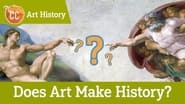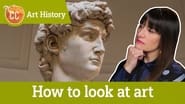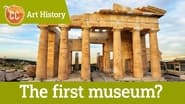
Rating:
0/10 by 0 users
Crash Course Art History (2024)
Over the course of 22 episodes, we’re going to learn about art history—the study of objects and images to understand their meaning and the people, places, and times they come from. Sarah Urist Green will equip you with a toolbox of terms to analyze and evaluate art, draw connections between different cultures and time periods, and ask big questions about how history gets made.
Writing:
Release Date:
Thu, Apr 11, 2024
Country: US
Language: En
Runtime: 10
Country: US
Language: En
Runtime: 10
Sarah Urist Green
Self - Host
Season 1:

Art history is much more than names, dates, and creepy babies. It helps us understand how history itself gets constructed and told. In this episode of Crash Course Art History, we’ll learn how interpreting artwork reveals connections among all of us, across cultures and across time.

How long do you typically look at an artwork, and what can you learn in that time? In this episode of Crash Course Art History, we’ll acquire a toolbox of terms to help us discover how all art is influenced by the time and place it was made in.

In this episode of Crash Course Art History, we’ll learn why museums are so much more than just collections of interesting and pretty objects. Their legacy includes everything from violence to theft, to, oddly enough, mermaid hands.

Michelangelo. Vincent Van Gogh. Pablo Picasso. The story of art history is told through the biographies of individual celebrity artists. In this episode of Crash Course Art History, we’ll learn about where the myth of the Great Artist comes from — and why it might be time for a new perspective.

In this episode of Crash Course Art History, we’ll keep digging into the myth of the Great Artist, with whether we can—or should—separate artists’ personal actions and beliefs from the art they create. Art historians are exploring new ways to think about artists’ relationship to their work and how to talk about controversial art.

What makes some art valuable enough to hang in museums? In this episode of Crash Course Art History, we’ll look at different ways we can figure out the value of art beyond the number on the price tag, and we’ll examine how culture, society, history, and storytelling influence how we evaluate artwork.

From cave paintings to public murals, humans have told stories with art for thousands of years. In this episode of Crash Course Art History, we discover that visual storytelling is elementally human — and so is competing over whose story is told.

From the Egyptian Book of the Dead to Tibetan Buddhist sand mandalas, humans have always reached for art to express religious ideas and impulses. In this episode, we’ll explore how concepts of the divine and spirituality intersect with the history of art.

From sunsets to double rainbows, nature’s full of beautiful things. So it’s not surprising that artists have found inspiration in Mother Nature for millennia. What is surprising is the wide variety of human concerns that nature art has been used to convey. In this episode of Crash Course Art History, we’ll learn about the ways artists use nature to make arguments about the world around us, and our place within it.

Art is often understood as a solitary act of personal expression. But art is also the basis for community from Alaska to Mali — and from gay rights advocates to Frida Kahlo appreciators. In this episode we’ll learn how community is created through art.

In this episode of Crash Course Art History, we’ll hold a mirror to our bodies…in art, anyway. We’ll learn what portraits and self-portraits can tell us about the people they represent and about artists who’ve used bodies to critique their societies.

How can the color “red” be a global commodity? How can the way a statue stands be a sign of cultural exchange? In this episode of Crash Course Art History, we’ll explore how trade networks have moved both materials and ideas — and how art reflects a multi-directional flow of influences.

For centuries, “official” art spaces have shaped whose work gets taken seriously. But there are no required qualifications for making art! In this episode of Crash Course Art History, we’ll explore amateurs and outsiders. We’ll learn how the line separating who’s in and who’s out has shifted over time — and how influences have drifted across it.

What counts as design? What counts as art? And how did this debate start? In this episode of Crash Course Art History, we’ll trace the history of privileging some materials and techniques over others. We’ll explore how street fashion, dinner plates, and a swan candelabrum blur boundaries that were never clear-cut to begin with.

Our cultural perspectives shape how we perceive art, including who we see as contributing to its most important movements. In this episode of Crash Course Art History, we’ll get to the truth behind the creation of modernism and bust the myth of its European beginning. We’ll show how modernism was a truly global movement, in which far-flung artists responded to a rapidly changing world.

From giant rock sculptures to Confederate statues, there’s something about public art that cranks up the temperature of debate. In this episode of Crash Course Art History, we’ll learn about public art’s diversity of media, how it shapes collective identity, and why it seems to cause such intense controversy.

Independent public art like graffiti and street art often gets a bad rap, thanks to its legal classification as vandalism. But these art forms have much to offer as a means for people to speak truth to power and take ownership of community spaces. In this episode of Crash Course Art History, we’ll explore the various ways artists have used illicit public art to express themselves.

What’s the line between inspiration and flat-out appropriation? In this episode of Crash Course Art History, we grapple with questions about artistic originality and authenticity that have plagued the art world for hundreds of years. In today’s world of AI-generated art, it’s only getting more complicated. You will see a few AI-generated images in this video as part of our effort to dive directly into the questions surrounding AI-generated art.

What makes a painting worth millions of dollars? In this episode of Crash Course Art History, we’re looking at the history behind today’s art industry and how we determine an artwork’s financial value. We’ll also learn how the big business of buying and selling art runs on imperialism, and how people in the art world are fighting back.

Art is the perfect tool for activists to get across their message and make people pay attention. In this episode of Crash Course Art History, we’ll learn about the centuries-long practice of iconoclasm, how art intersects with protest movements, and what happens to artists when the authorities aren’t thrilled by their acts of resistance.

How do smartphones and 3-D models change how we experience art? And even history itself? In this episode of Crash Course Art History, we’ll learn how technology is shifting the ways we think about art’s past, present, and future.



